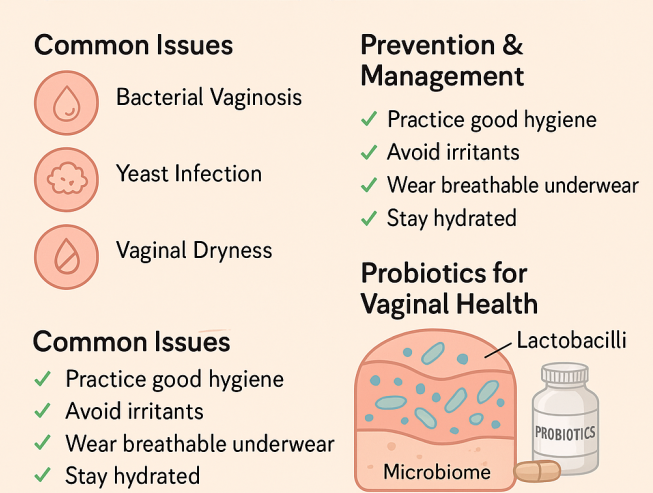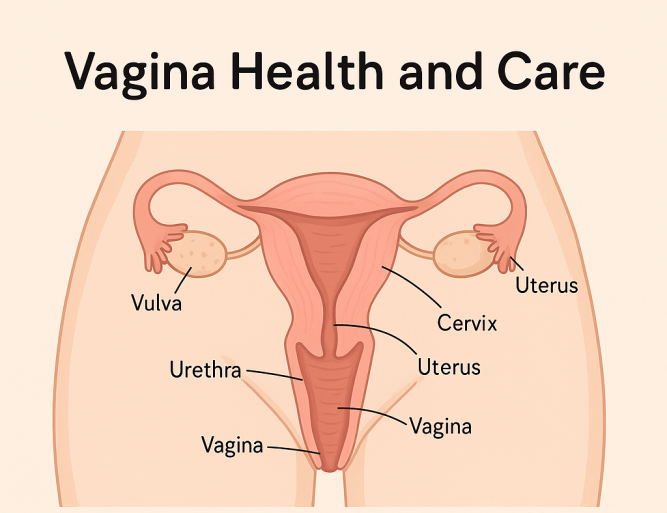Vaginal health is an important part of my overall well-being and quality of life. Feeling comfortable, staying infection-free, and supporting natural balance all start with the right daily habits and awareness. When I make vaginal care a regular part of my routine, it helps me steer clear of discomfort and gives me peace of mind. Probiotics play a key role in this process, and choosing them wisely can really support my long-term wellness.

Anatomy & Function of the Vagina
The vagina isn’t just a single part; it works as part of a larger reproductive system. Understanding the basic structure helps me care for it better:
- Vulva: The outer parts, including the labia and clitoris. This area provides a physical barrier and sensory function.
- Vagina: The muscular canal that connects the vulva to the cervix.
- Cervix: The narrow gateway between vagina and uterus.
- Uterus, fallopian tubes, and ovaries: Internal organs behind the cervix, vital for menstruation and fertility.
Some of the main jobs the vagina handles include:
- Producing natural discharge that flushes out unwanted bacteria.
- Maintaining an acidic pH between 3.8 and 4.5, mostly thanks to Lactobacillus bacteria that make lactic acid and hydrogen peroxide as defenses.
- Balancing a complex microbiome; good bacteria protect me from harmful outbreaks and help stop infections before they start.
By staying aware of these basic functions, I remind myself why simple, consistent care is so important.
Key Aspects of Vaginal Health
My vaginal health depends on a few main factors. Keeping each one in check helps everything stay balanced:
- pH Balance: An acidic environment keeps bad bacteria and yeast at bay. Using harsh soaps or douching can upset this balance.
- Moisture Levels: Healthy moisture reduces irritation. Low estrogen, dehydration, or aging can make natural lubrication dip.
- Microbiome Health: The right mix of bacteria, mostly Lactobacillus strains, should outnumber the harmful ones. Probiotics help support this balance.
- Hormonal Health: Estrogen keeps the tissue plump and elastic. Big hormone changes like menopause or pregnancy can affect lubrication and comfort.
- Stress and Mental Health: Chronic stress weakens immunity. When I’m under pressure, I find infections appear more easily.
Common Vaginal Issues & Prevention Tips
Even with good habits, some vaginal concerns are pretty common. Recognizing early signs and taking simple actions can stop most problems from getting worse:
- Bacterial Vaginosis (BV): A fishy odor and thin gray discharge are common signs. I avoid douching, wash only with water, and use probiotics regularly; this keeps healthy bacteria strong.
- Yeast Infections: If I have intense itching and notice thick, white cottage cheese-like discharge, I cut back on sugar, choose breathable underwear, and take a probiotic with Lactobacillus strains.
- Urinary Tract Infections (UTIs): Burning with urination and needing to pee often are warning signs. Peeing after sex and drinking more water really helps. Some probiotics can give a boost to urinary tract wellness too.
- Vaginal Dryness: Painful intercourse or stinging can signal dryness. I rely on waterbased lubricants and consider vaginal moisturizers. If dryness keeps up, hormone changes could be behind it; that’s something my doctor can help me get a sense of.
- The Role of Probiotics in Vaginal Wellness
Probiotics are live bacteria that, when I take them in the right amounts, directly support my vaginal and urinary health. Here’s how they help:
- They support a healthy pH balance by boosting the good bacteria like Lactobacillus.
- Certain strains, such as Lactobacillus rhamnosus GR-1 and Lactobacillus reuteri RC-14, help control overgrowth of bacteria like Candida (yeast) and Gardnerella (connected to BV).
- Probiotic use may make it less likely that I’ll get recurring infections.
- They keep my mucosal immune barriers sturdy and help me feel more comfortable, especially during hormone changes like pregnancy or menopause.
A daily probiotic supplement—with at least 10 to 30 billion CFUs and timerelease capsules—offers an easy, reliable way to help keep my inner balance. I look for supplements labeled specifically for supporting women’s vaginal health, made with strains backed by research to maintain healthy flora, and free of unnecessary additives.

My Probiotic Recommendation
If you want to add probiotics to your care routine, I suggest trying a top-rated women’s probiotic. Many on the market now deliver:
- Multiple vaginal health strains, like L. rhamnosus and L. reuteri
- 30 billion CFUs per serving
- Time-release delivery so good bacteria reach your gut and vaginal area
- No animal or gluten-based ingredients
On my healthandwellnessvoyage.com website, there is an article “Benefits of Probiotics for Women.” That post contains the proven probiotic strains I trust for daily support.
Best Practices for Daily Vaginal Care
Some basic habits help me ward off irritation, discomfort, and infections:
- Wash only with warm water on the vulva. I never put soap inside the vagina or use scented products, since they can upset my pH.
- I change out of sweaty gym clothes quickly and don’t sit in damp swimsuits for long periods.
- I sleep without underwear sometimes to keep things cool and airy.
- I avoid douching or aggressive cleansers; these strip away healthy bacteria.
- I add prebiotic foods (like garlic, onions, bananas) to my diet, since they help nourish the probiotics I take.
By sticking with these steps, I give my body a better chance at holding onto its natural defenses.
Lifestyle Tips & Natural Products for Vaginal Health
Staying healthy in general always supports vaginal comfort. Here are daily habits that work for me:
- Hydration: Drinking plenty of water keeps my natural lubrication at normal levels.
- Balanced Diet: Eating lots of whole grains and fiber but going easy on sugar makes yeast less likely to grow wild.
- Cotton Underwear: Breathable fabrics help keep the area dry and reduce irritation risk.
- Gentle Herbal Rinses: If I’m not allergic, mild herbal teas like calendula or chamomile can be soothing on the vulva (but never used internally without a doctor’s OK).
- Probiotic Supplements: My daily probiotic supports my whole body’s bacteria balance—not just digestion, but also vaginal and urinary health.

FAQs on Vaginal Health & Probiotics
Below are some common questions about vaginal health, plus how probiotics can fit into daily care:
Q: How often should I take a probiotic for vaginal health?
A: Once daily is usually enough, especially to prevent infection or keep pH stable. If infections are frequent, a doctor may suggest a different dose.
Q: Can probiotics cure an active vaginal infection?
A: Probiotics are best for prevention and maintenance of balance. If I’m actively infected, I check in with my doctor—antibiotics or antifungals might be necessary, and probiotics can help lower the risk of future infections once treatment is finished.
Q: Are probiotics safe during pregnancy?
A: Most probiotics for vaginal health are considered safe during pregnancy, though I always talk with my healthcare provider before adding anything new when I’m expecting.
Wrapping up.
Paying attention to my vaginal health boosts the rest of my body and brightens my overall confidence and mood. A few gentle habits, smart food choices, and daily probiotics can make a big difference. Picking the right probiotic supplement is one of the easiest and most effective ways I take charge of my wellness.
Try the following Probiotic Capsules now to support comfort, natural balance, and long-term well-being:
Capsule Form [ here] Garden of Life Dr. Formulated Women’s Probiotics
Capsule Form [here] Seed DS-01 Daily Synbiotic
Capsule Form [ here] Culturelle Women’s Healthy Balance
For more super detailed wellness tips, check out my guide on Benefits of Probiotics for Women.
